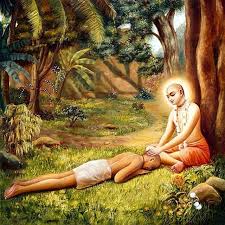Verse 8
अतो विमुक्त्यै प्रयतेत्विद्वान्
संन्यस्तबाह्यार्थसुखस्पृहः सन् ।
सन्तं महान्तं समुपेत्य देशिकं
तेनोपदिष्टार्थसमाहितात्मा ॥ ८ ॥
ato vimuktyai prayatetvidvān
saṃnyastabāhyārthasukhaspṛhaḥ san |
santaṃ mahāntaṃ samupetya deśikaṃ
tenopadiṣṭārthasamāhitātmā || 8 ||
(Therefore, the learned seeker who is
striving to gain this freedom within and who has renounced all his desires
for pleasures in the sense objects should duly approach a good and generous
Master and must live attuned to the true significances of the words of the
Master.)
We have here a positive declaration of
what exactly a seeker should do in order that he may be
well-established on the path of Truth.
A seeker in Vedanta is not a nonentity
who has walked into the sanctum of a temple or has casually thought of
sitting in prayer or visiting a sacred place. These constitute but the
very primary steps in spiritual life.
The word Vidvan' is used here to
indicate a rue seeker. When, therefore, a student having a cursory
knowledge f life and its meaning realises the futility of running after
sense objects, he comes to a certain amount of renunciation of desires
and thus he approaches his Master.
Sankara in this verse also lists
the special qualifications necessary for a seeker on the spiritual
path.
santam - The word 'santa'
is often used in vernacular to indicate a sannyasin, but rarely does one
realise what exactly the term means.
He is a santa who is firmly established
in the consciousness of pure Existence (Sat). A Guru must not only be a
Man of Realisation and experience but he should be a 'mahanta', a
large-hearted, sympathetic, kind person. One can be a Guru only if
one has the required magnanimity, intimate personal experience of the
Divine and great familiarity with scriptures.
A competent teacher's
qualification is given in Mundaka Upanishad as,
"stotriyam Brahmanishtam".
Brahmanishtah means the one who
abides in Brahman. That is what he preaches and what he is, both are not
different. What he teaches is Brahman and he himself is Brahman. If the teacher
has to reveal that Brahman as yourselves, as not something of an object to be
realised in later time, then alone the student would be able to say Ahaṁ Brahmasmi. Only if it is Ahaṁ Brahmasmi for the teacher, then alone
he can be a Tat Tvam Asi, then alone the student would also say Ahaṁ Brahmasmi. Therefore he is called
Brahma Nishtah. Brahma Nishta is one for whom the subject matter and himself
are identical.
And the second qualification is
stotriyaḥ; he should have the
methodology of communication; which is uniquely designed and developed in the
scriptures. A particular method of communication, in which you introduce a
concept and go to the next higher concept and negate the previous concept; then
go to the next one and then negate the previous one and when everything
is finally negated; and what should be left behind? I, the negator, alone
should be left behind, the unnegatable-I; which is unobjectifiable; that
unnegatable; and unobjectifiable consciousness alone will be left behind; this
is designed and developed in the scriptures alone.
The divine attitude of full receptivity
is the aroma of a heart, which has reverence for and surrender to, faith
in and love for the Guru.
Again, even with all the prescribed
qualifications, if a seeker were to reach the feet of a perfect Master,
the transferred knowledge cannot take root in the student, unless he is
himself ready to strive along the path.
The major part of the work
depends upon our own efforts to rehabilitate ourselves. Thus, it is said,
the individual should try to live the deep significances of the
precepts of the Master.
Swami Sivananda says,
Initiation into the mysteries of
Brahman will fructify only in that disciple's mind who is desireless and will
produce Jnana in him.
It takes a long time for the charcoal
to catch fire but gun powder can be ignited within the twinkling of an eye.
Even so, it takes a long time for igniting the fire of knowledge for a man
whose heart is impure. But an aspirant with great purity of heart gets
knowledge of the Self within the twinkling of an eye, within the time taken to
squeeze a flower by the fingers.
Love.







